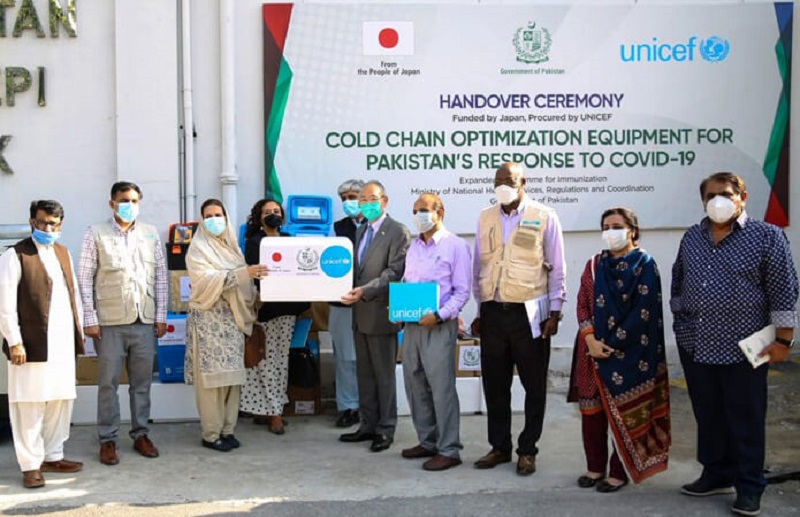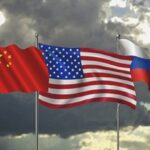ISLAMABAD: Funded by the Government of Japan and procured through the United Nations Children’s Fund (UNICEF), cold chain optimization equipment worth $6.59 million have been handed over to the Government of Pakistan for enhancing capacity to store COVID-19 vaccine.
Parliamentary Secretary on Health, Dr Nausheen Hamid received the cold chain equipment from the Ambassador of Japan, H.E. Mr Matsuda Kuninori, in presence of the UNICEF Representative in Pakistan, Ms Aida Girma, at a ceremony held in the National Emergency Operation Centre, Expanded Programme for Immunization (EPI).
Speaking at the occasion, Dr Nausheen Hamid said, “We greatly value the significant contributions made by Japan during the last 70 years of its diplomatic relations with Pakistan. Over the years, the two countries have partnered in various sectors including health, education, power and many others. I affirm our strong desire to further deepen and broaden our bilateral ties with Japan.”
“The Expanded Programme for Immunization in Pakistan has a strong cold chain system that is considered the backbone of the programme as it handles and stores massive quantities of vaccines inclusive of all kinds of COVID-19 vaccines. It is, however, important to know that the cold chain system can be risky in countries which have extreme temperatures and the power supply is unreliable,” she added.
The Parliamentary Secretary on Health said, “I am grateful to the Government of Japan for providing this cold chain optimization equipment for vaccine storage and ensuring quality check as it would definitely strengthen our existing system.”
The equipment procured through funds from Japan includes power generators, voltage regulators and temperature monitoring devices which will enhance the vaccine storage capacity of EPI, especially at provincial and district levels where power outage and voltage fluctuation is frequent. The new equipment would help to ensure optimum temperature control at storage facilities thus maintaining the efficacy of the Covid-19 vaccine.
Japanese funds will also be used for strengthening the capacity of health care staff to handle the cold chain equipment.
Japan has extended a total of $23.5 million grant assistance to Pakistan for its counter-COVID19 measures including provision of hygiene items, medical equipment, and training of health care staff.
Speaking at the event, Ambassador MATSUDA stressed that Japan has prioritized the health sector as part of its development cooperation policy for Pakistan for decades, including Maternal & Child Health, Polio Eradication, Routine Immunization and Counter-COVID-19 measures. He expressed his hope to open a new area of cooperation in the future partnership between Japan and Pakistan in the health sector, suggesting that tackling diabetes could be one of the candidates.
“I am looking forward to seeing a new chapter added to the friendship between Japan and Pakistan on the occasion of the 70th anniversary of the establishment of diplomatic relations between the two countries next year,” the ambassador said.
As part of the COVID 19 pandemic response UNICEF has been assisting the Government of Pakistan in procuring CoVID-19 vaccines through the COVAX facility. It has also procured cold chain, laboratory and personal protective equipment and handed over to the Ministry of National Health Services, Regulations and Coordination.
UNICEF Representative in Pakistan, Aida Girma said, “Today’s ceremony reinforces the high level and longstanding support of the Government of Japan to UNICEF in its efforts to procure vaccines and essential equipment for strengthening immunization services in Pakistan.”
“May it be routine immunization or the large-scale COVID-19 vaccination drive, storage of vaccines at optimum temperature is essential to maintain their efficacy and effectiveness. The cold chain support equipment being handed over to the Ministry of National Health Services, Regulations and Coordination today, will help in making vaccines available to people across the country, especially the marginalised and those living in hard to reach areas,” Ms Girma said.


